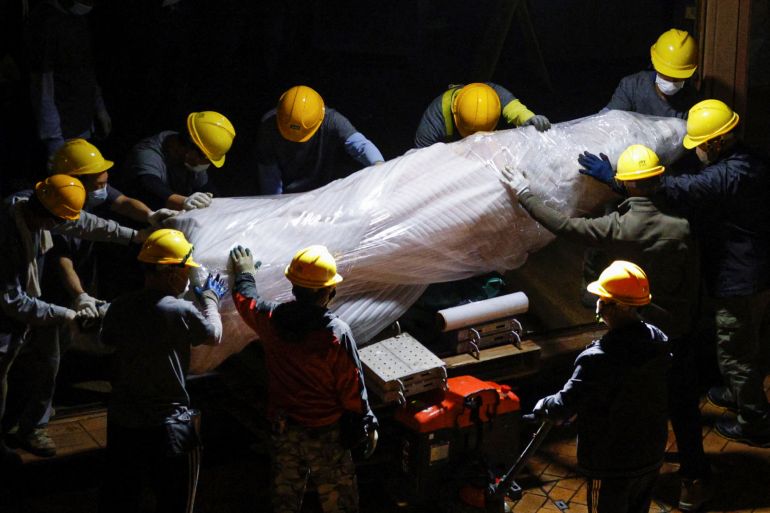‘Unfounded’: Hong Kong slams US, UK reports on declining freedoms
Territory’s government tells countries to stop ‘interfering’ in its internal affairs after damning assessments on freedoms.

Hong Kong has responded with fury over what it described as “unfounded and ridiculous allegations” in key reports from the United Kingdom and the United States that said the territory’s democratic rights and freedoms were continuing to deteriorate.
In a six-monthly update released on Thursday, the UK, which ruled Hong Kong as a colony before its return to China in 1997, said that “alternative voices in Hong Kong’s executive, legislature, civil society and media ha(d) been all but extinguished”.
Keep reading
list of 4 itemsNBA returns to Chinese television following Hong Kong blacklist
UK judges quit Hong Kong’s top court over security law
Hong Kong eases quarantine amid angst over ‘zero COVID’ isolation
The US reached a similar conclusion in its report covering the 12 months from March 2021: “(Chinese) authorities took actions that eliminated the ability of Hong Kong’s pro-democracy opposition to play a meaningful role in the city’s governance and effectively criminalized peaceful political expression critical of the central and local governments,” it said.
The Hong Kong government quickly rejected the assessments.
“We strongly oppose the unfounded and ridiculous allegations against the HKSAR (Hong Kong Special Administrative Region) Government made by foreign countries through various reports,” it said in a statement, adding that Hong Kong continued to enjoy “a high degree of autonomy” under the “one country, two systems” that was adopted on its return to Chinese rule.
“The HKSAR Government urges foreign countries to stop interfering into the internal affairs of China through Hong Kong affairs,” it said.
The latest reports from the UK and US come after two British Supreme Court judges resigned from the territory’s highest court, citing the effects of the National Security Law that China imposed nearly two years ago.
Chief Executive Carrie Lam on Thursday dismissed their exit as “politically motivated“.
‘As vibrant as ever’
The UK report highlighted the closure of independent and pro-democracy media outlets, including Stand News, which was forced to close in December after a police raid and the arrests of its current and former editors.
The hugely popular Apple Daily also stopped publication in June after its assets were frozen and offices raided. Its founder, tycoon Jimmy Lai, is one of the highest profile people to be arrested under the National Security Law and remains in jail, having been denied bail.
The report also noted the targeting of British NGO Hong Kong Watch, which it described as an “egregious and unacceptable example of how the authorities appear to be trying to use the law to censor even those outside of Hong Kong’s borders”.
Both reports also noted the changes to Hong Kong elections to ensure only “patriots” can stand for office, with fewer seats in the legislative council chosen by popular vote and many pro-democracy politicians jailed or disqualified. Turnout in the December poll was the lowest of any election since the handover.
They also noted the crackdown on any kind of commemoration of Tiananmen Square with the ban on an annual vigil to remember those killed in 1989, the closure of a museum on the incident and the removal of statues marking the incident.
“As the 25th anniversary of Hong Kong’s handover to Beijing approaches, Hong Kong’s freedoms are diminishing while the PRC (People’s Republic of China) tightens its rule,” US Secretary of State Antony Blinken said in a statement accompanying the latest Hong Kong Policy Act Report. “The differences between Hong Kong and cities in mainland China are shrinking due to ongoing repression from the PRC.”
China imposed the security law in June 2020 after huge pro-democracy protests, some of which turned violent, swept the city in 2019. The sweeping law criminalises acts Beijing deems secession, subversion, terrorism or collusion with foreign powers.
On Friday, Hong Kong said the law had “restored stability” and that the government retained an “unwavering commitment” to the rule of law and judicial independence.
It insisted that the security law did not impede the freedoms of Hong Kong, which China had promised to honour for at least 50 years.
“Law-abiding people will not unwittingly violate the law,” the government said.
It also insisted that Hong Kong’s media landscape remained “as vibrant as ever” with some 211 organisations registered with the government.
“The media can exercise their right to monitor the HKSAR Government’s work, and their freedom of commenting on or even criticising government policies remains uninhibited as long as this is not in violation of the law,” the government said.